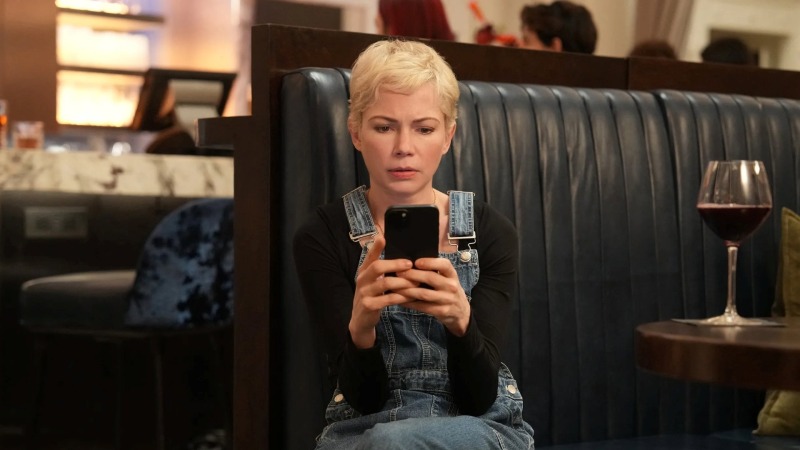Dying for Sex Puts a Kink in the Cancer Comedy Genre
Photo by Sarah Shatz, courtesy of FX
Besides rubber chickens and Scottish kids swearing, nothing’s funnier than cancer. Maybe it’s the hard k sound. Maybe it’s the assless hospice gowns. Or maybe it’s the way the illness hijacks the body from the inside out, until all we can do is succumb to our inevitable demise in complete agony, leaving our grieving loved ones to curse the God who watches with indifference as we slowly sink into the eternal nothingness of the next realm. Are you laughing yet?
So if cancer’s not that funny after all, what’s up with the “cancer comedy” genre? Although a certain gallows humor around terminal illness has existed in literature and drama for eons, cancer’s prominence in the 20th century as the number two worldwide killer, coupled with its uniquely heinous method of attack on the body, has made it an apt conduit for conflict-driven narrative. It’s not hard to dig for what’s sad, what’s dramatic about cancer. Its gravity would be unimaginable if it weren’t also so ubiquitous, hadn’t touched so many of us as to skew prosaic. The funny of it all then comes from these built-in juxtapositions: death by cancer is arbitrary yet personal, pitiable yet inspiring, grotesque yet beautiful, drawn-out yet over too soon, indescribable yet straightforward. One of the funniest standup specials of this century, Tig Notaro’s Live (2012), opens with her revealing to the crowd, “Hello, I have cancer. How are you?”
Dying for Sex, FX/Hulu’s new eight-episode miniseries adapted from the homonymous documentary podcast, is familiar with intrinsic ironies. Punny title and all, the show has the sort of off-kilter yet tantalizing logline that this century’s cancer comedies thrive on: A depressed former comedian gets his diagnosis and tries to make amends and nab stage time (Funny People [2009]); high school sucks but leukemia sucks harder (Me and Earl and The Dying Girl [2015], Alexa & Katie [2018–2020]); two old-timers tick off all the activities they’ve always dreamed of doing while the clock ticks down (The Bucket List [2007]). Dying for Sex’s hook starts right away. In the first scene, Molly (Michelle Williams) finds out she’s been diagnosed with Stage 4 metastatic breast cancer during a couple’s therapy session with her doting but sexually incompatible husband Steve (Jay Duplass). Hoping to give the body that will soon betray her one last hoorah, Molly leaves him right then and there and sets off with her best friend Nikki (Jenny Slate) on an odyssey to achieve la petite mort before her grand mort. Let the hijinks ensue!
If on paper this sounds like the show underplays the severity of Molly’s situation, rest assured. Like others in this nimble subgenre, Dying for Sex is a laughjerker, the type of story that forces you to laugh so you won’t cry (but you’ll still cry anyway—a lot). These shows earn trite descriptors such as “heartstring-tugging,” “life-affirming,” “human,” because they’re just twee and self-aware enough to use humor to soften and paradoxically enhance the sorrow at their core. It’s effective, if predictable. Scenes alternate between being funny vs. sad, the division between the two always clear. Take 50/50 (2011): Joseph Gordon-Levitt shaving his head with a pube trimmer = funny! Him preparing for a surgery he will likely not survive = bring out the tissues.
But this is perhaps Dying for Sex’s crowning achievement: it upends the cancer comedy genre while hitting—nay, striking, flogging, paddling?—all its well-worn beats. As Molly dives spread-legs first into discovering what turns her on, she abandons the chokehold penetrative sex has on the cultural imagination and finds instead a predilection for dominating men. Whether she’s demeaning her hookup app match’s penis or checking an adult man in a Scooby Doo costume for fleas, the show’s portrayal of Molly’s carnal awakenings is simultaneously whimsical yet savvy and ultimately affirming. Rather than making her and her partners’ erotic proclivities either the butt of the joke or overly exoticized, the humor comes from the natural, astonishing folly of sex—and having a body at all—itself.
-

-

-

-

-

-

-

-

-

-

-

-

-

-

-

-

-

-

-

-

-

-

-

-

-

-

-

-

-

-

-

-

-

-

-

-

-

-

-

-








































